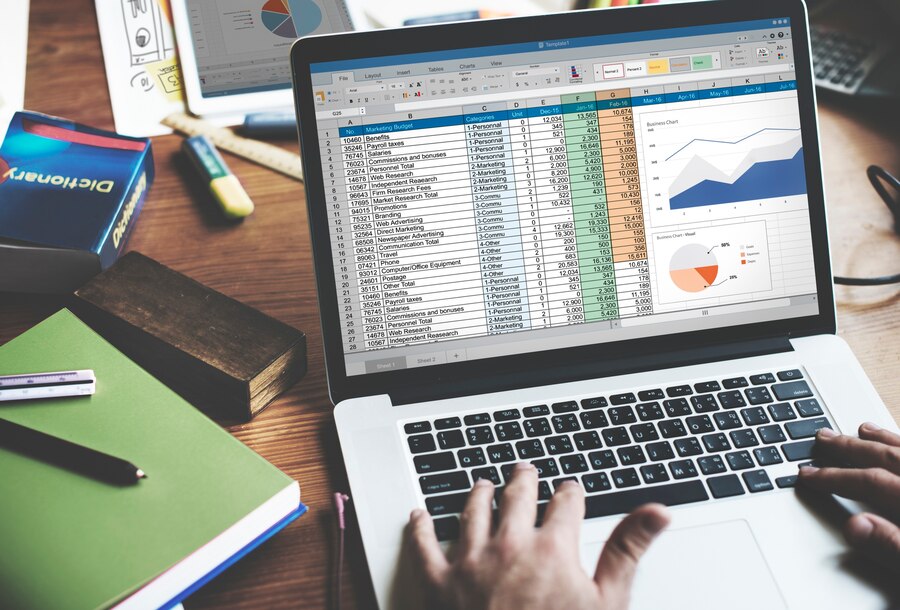
Introduction: Finance Meets Automation
Managing finances has never been easy—especially for small businesses juggling sales, payroll, taxes, inventory, and invoicing. Traditional spreadsheets and paper trails often lead to errors, delays, and miscommunication. That’s where accounting software steps in to transform chaos into clarity.
In this post, we’ll take a deep dive into the evolution, benefits, and best practices for using accounting software—especially tailored for small businesses in the UAE.
From automating everyday tasks to helping with tax compliance and reporting, accounting software empowers business owners with real-time financial visibility, enabling smarter decisions and sustainable growth.
🧾 What Is Accounting Software?
Accounting software is a digital application designed to manage financial transactions, reporting, and compliance. Whether you’re running a bakery, e-commerce store, consultancy, or construction firm, the right software can save hours of manual work and significantly reduce errors.
🎯 What Does It Do?
Typical accounting software offers the ability to:
-
Record income and expenses
-
Automate invoicing and billing
-
Reconcile bank statements
-
Calculate VAT and generate tax reports
-
Track cash flow
-
Manage payroll and vendor payments
-
Generate profit & loss statements, balance sheets, and ledgers
⚙️ Types of Accounting Software
| Type | Description |
|---|---|
| Cloud-Based | Accessible from any device with internet. Ideal for real-time collaboration. |
| On-Premise | Installed on local computers. Offers more control but less mobility. |
| Open Source | Free and customizable, but often lacks support. |
| Industry-Specific | Tailored for specific industries like construction, retail, or hospitality. |
🔍 Key Benefits of Accounting Software
-
Time-Saving: Automates repetitive tasks like billing, payroll, and reconciliations.
-
Accuracy: Reduces human error in calculations.
-
Compliance: Helps meet VAT, payroll, and reporting requirements.
-
Real-Time Reporting: Allows data-driven decisions with up-to-date insights.
-
Scalability: Grows with your business.
👩💼 Accounting Software for Small Business
Small businesses face unique financial challenges. They typically operate on limited budgets, with lean teams that juggle multiple roles. Here’s how accounting software for small businesses plays a pivotal role in streamlining their operations.
🏢 Why Small Businesses Need It
-
Limited Staff
Small teams can’t afford a full accounting department. -
Cash Flow Pressure
Every invoice, expense, and payment counts. -
VAT and Tax Compliance
UAE’s VAT regulations apply even to small entities. -
Frequent Transactions
Whether you’re selling on Instagram or running a small shop, sales are constant—and must be tracked. -
Decision-Making
Real-time insights can mean the difference between profit and loss.
📌 Must-Have Features for Small Businesses
-
Simple Dashboard: Easy-to-use UI without accounting jargon.
-
Invoicing & Payments: Create, send, and track invoices with payment integration.
-
Expense Tracking: Upload receipts and categorize expenses automatically.
-
Mobile App Support: Manage on the go.
-
Multi-Currency Support: Especially for international clients or vendors.
-
Inventory Integration: For businesses that manage physical products.
-
Project Costing: Track profitability per client or job.
🧪 Use Case Examples
1. Freelancer in Abu Dhabi
Before: Manual invoicing and Excel.
After: Switched to cloud software with mobile invoicing. Saved 6+ hours/month and improved cash flow.
2. Home-Based Catering Business in Sharjah
Before: Paper receipts and manual price lists.
After: Adopted an app-based accounting tool. Started tracking ingredient costs, pricing meals accurately.
3. Boutique Design Agency in Dubai
Before: Complex spreadsheets to track client payments.
After: Used accounting software with client profiles. Reduced overdue payments by 40%.
💼 Best Accounting Tools for Small UAE Businesses
| Software | Pros | Cons |
|---|---|---|
| Zoho Books | UAE VAT compliant, feature-rich | Learning curve for new users |
| Tally Prime | Popular in the region | Mostly on-premise |
| Xero | Great UI, strong integrations | Higher price point |
| QuickBooks Online | Globally trusted, good support | Limited local VAT features |
| Wave | Free for basic use | No UAE-specific compliance |
🇦🇪 Accounting Software UAE
Accounting software in UAE must serve a dual purpose: helping businesses operate efficiently while ensuring compliance with local tax regulations, especially VAT.
Let’s explore what makes UAE a unique landscape and how accounting tools adapt to it.
📜 UAE Financial Landscape
-
VAT Introduction (2018)
UAE businesses earning more than AED 375,000 annually must register for VAT. -
Fines for Non-Compliance
Late filings or incorrect returns can result in hefty penalties. -
Free Zones vs. Mainland
Different jurisdictions have distinct accounting and reporting requirements. -
Bilingual Communication
English is dominant, but some clients and government documents are in Arabic. -
Digital Adoption
UAE SMEs and startups are rapidly digitizing their operations, especially post-COVID.
🧾 VAT-Ready Software
Accounting software in the UAE must help businesses:
-
File VAT returns (Form 201)
-
Issue VAT-compliant invoices
-
Calculate input vs. output VAT
-
Reconcile accounts for audits
🏆 Recommended UAE-Optimized Tools
| Tool | VAT Support | Arabic UI | Local Partner |
|---|---|---|---|
| Zoho Books | ✔️ | ❌ | Yes |
| Tally Prime | ✔️ | ✔️ | Yes |
| QuickBooks (MENA edition) | ✔️ | ❌ | Yes |
| Focus Softnet | ✔️ | ✔️ | Yes |
| Sage Accounting | ✔️ | ❌ | Yes |
🌟 Tips for Choosing the Right Software in UAE
-
Check for FTA Accreditation
The UAE’s Federal Tax Authority maintains a list of verified software. -
Evaluate Arabic Support
Especially if your clients or staff prefer Arabic. -
Local Support Availability
On-ground help can speed up onboarding and troubleshooting. -
Cloud vs. On-Premise
Cloud is recommended for ease of access and data backup.
🚀 Digital Transformation Incentives
The UAE government has launched several initiatives encouraging businesses to digitize—making it the perfect time to switch from manual bookkeeping to smart systems.
📊 Accounting KPIs That Matter
When you use accounting software, it becomes easier to track key financial metrics:
| KPI | Why It Matters |
|---|---|
| Accounts Receivable Turnover | Indicates how quickly clients pay you |
| Gross Profit Margin | Reveals pricing effectiveness |
| Net Profit Margin | Tracks business health |
| Cash Flow Forecast | Prevents cash shortages |
| Debt to Equity Ratio | Measures financial leverage |
🔮 The Future of Accounting for SMEs in UAE
Here’s where things are heading:
1. AI & Machine Learning
-
Automated categorization of transactions
-
Predictive cash flow and expense tracking
2. Blockchain Ledgering
-
Transparent, tamper-proof financial data
3. Embedded Finance
-
Banking features built right into accounting platforms
4. Real-Time Tax Filing
-
Seamless syncing with UAE tax authorities
5. Custom Dashboards
-
Industry-specific views for contractors, traders, and service providers
📝 Conclusion
Managing money is central to running a successful business. Whether you’re a solo freelancer or a growing small business in the UAE, accounting software is your financial command center.
With the right tool, you can automate tasks, stay VAT-compliant, and make data-backed decisions. For small businesses especially, this can mean the difference between surviving and thriving.
The UAE offers a unique business landscape, and choosing accounting software for small businesses that’s also optimized for UAE regulations ensures you stay ahead of the curve.
Don’t wait until tax season to get organized. Invest in a system that works for you—your future self will thank you.
❓ FAQs
1. Is accounting software necessary for small businesses?
Yes, it helps streamline finances, improve accuracy, and maintain VAT compliance without needing a full-time accountant.
2. Which accounting software is best for UAE VAT?
Zoho Books, Tally Prime, and Focus Softnet are excellent choices that support local VAT rules.
3. Can I use global tools like QuickBooks in UAE?
Yes, but ensure you’re using the MENA/UAE-specific version for VAT features.
4. Is cloud-based accounting software safe?
Yes, modern platforms use encryption, two-factor authentication, and secure data centers to protect your data.
5. How much does accounting software cost in UAE?
Basic plans start around AED 50–100/month, with enterprise versions going higher depending on features.







